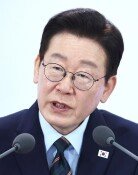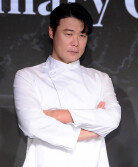[Opinion] An Administration Who Plays with Words
[Opinion] An Administration Who Plays with Words
Posted February. 07, 2002 09:36,
The ability to use the people`s tendency to forget things through the press is considered one of many political skills. Regular people find out what is happening in the world through the press and since the press has to report what is happening everyday without interruption, the readers and subscribers cannot help but forget the facts of yesterday today and the facts of today tomorrow. Hence, whenever a controversy erupts, the politicians always urge people to wait one more week.
The recent succession of scandals of political corruption was followed by the administration`s Cabinet reshuffling, which is another instance of the government using the people`s forgetfulness to convert their sympathies in their favor.
Yet, the success or failure of such skills depends on how sincerely one handles the problems overall. If the Cabinet reshuffling was acceptably successful to the people in resolving the problems facing us, it would have achieved at least a minimal amount of success. The intention, however, was found to be so far off from the reality that the situation only got worse. When there is dishonesty in the picture, there is a gap between word and reality. The current administration`s leading characteristic is its two-faced nature and this showed very clearly through this recent event.
The Cabinet reshuffling had two special characteristics: the defense represented by the change of the Justice Minister, and the offense represented by the appointment of special policy posts in the Cheong Wa Dae. The intention is to suppress as much as possible the reach of the scandals to the core political leadership, and to take the offensive in raising public support by making a breakthrough in the South-North policy issue. The administration explained that the Cabinet reshuffling went beyond political interest and was carried out in order to focus all its energy in national administration. Even if one overlooks the question of how one can clearly divide politics and national administration, it is impossible to comprehend how they can claim that their actions are not political when they have the power to change personnel, mobilize financial resources, and decide policy. Reshuffling the Cabinet is a political act. If, however, they think that this reshuffling with their intention will actually change the situation, they are gravely mistaken. They have already crossed the line of simply protecting the administration, and the stakes are too high now to take care of the problems with a mere gesture.
The reason why lies in the very term, the `people`s government` namely the `people` part. When we look at everything that has happened so far, the `people` actually means `me` according to the logic of the present authoritarian politics. It would be, actually, quite true to reality to call the `people`s government` as `my government` but this omniscient `me` has now become a blind duck.
To take another example, in the foreign relations arena, the explanation that the South Korea and the U.S. share the same `policy of tolerance` toward the North, even though their pursuit of their respective national interests may be somewhat different, is something that needs to be closely examined. The U.S.`s policy toward the North is not tolerant, but interventionist, while the policy of tolerance that the administration is talking about is a policy of appeasement. This is a very big difference. One might say that the respective policies share a common point in leaving open the door to dialogue, but the fact is that it is very hard to find anything in common in the substance of the policies.
U.S. President George W. Bush`s inclusion of North Korea in the `axis of evil` is provoking much reaction, but the word to pay attention to here is `axis`. This is a term that can be used in the context of a world-scale war. This means, then, the U.S. will handle the North Korean problem and will formulate its policy measures on a global level.
This stance, furthermore, goes hand in hand with military interests. Hence, although the U.S. may not oppose the South`s pursuit of a tolerance policy on the social, economic, and cultural levels, if this pursuit crosses the line and proceeds to the strengthening of the North Korean military, the U.S. will not stand idly by.
The time for playing with words has passed, but it does not seem that the boat is about to turn around. Considering the nature of the administration, that seems impossible. It still has until the summer and this is not so short a time politically. The administration is hoping to put hope back into the economy by hosting two international events and reconfigure the political arena in its favor, but no one knows whether fortune is on their side. One thing is for certain. A painful drama is about to unfold.
Roh Jae-Bong (Former Prime Minister)



![[단독]폴란드, 韓 해군 최초 잠수함 ‘장보고함’ 무상 양도 안받기로](https://dimg.donga.com/c/138/175/90/1/wps/NEWS/IMAGE/2026/02/27/133437397.1.jpg)



